Key takeaways:
- Genealogy groups foster community support, allowing members to collaborate and share unique expertise, leading to breakthroughs in family research.
- Participation in activities like workshops, guest speaker sessions, and group projects enhances learning and strengthens bonds among members.
- Personal experiences shared within groups highlight the emotional connections we form, reminding us that genealogy is about relationships, not just records.
- Being part of genealogy groups develops essential skills such as research, critical thinking, and empathy, enriching both personal and collective journeys into the past.
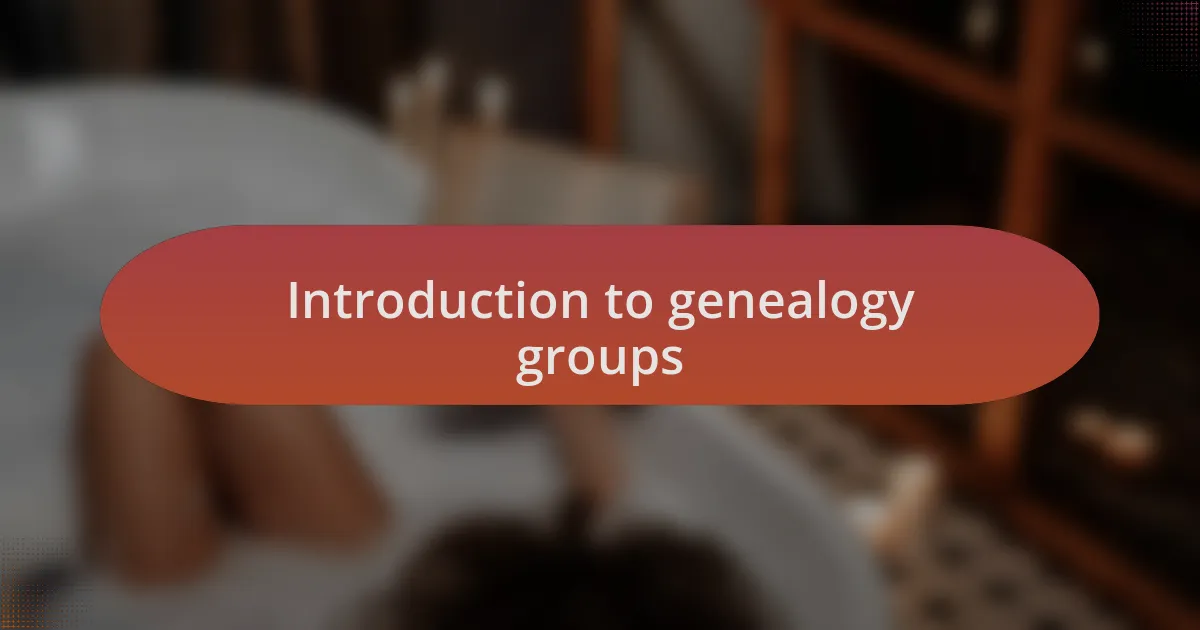
Introduction to genealogy groups
Genealogy groups can be fascinating hubs of collaboration and discovery. I remember my first meeting, walking in with a mixture of excitement and nervousness. The atmosphere buzzed with shared passion, and it struck me—how often do we find ourselves in spaces where everyone understands the thrill of connecting past with present?
In these groups, members can exchange knowledge, tips, and resources that might be difficult to find on our own. I’ve seen firsthand how a single connection can lead to breakthroughs in family trees. Have you ever thought about how much wisdom is waiting just around the corner in your local genealogy group? Each member brings unique perspectives and experiences that enrich the overall journey of uncovering our heritage.
Joining a genealogy group can even feel like stepping into a family itself. I recall one member who shared a heartfelt story about reuniting with a long-lost relative after uncovering crucial ancestral links. It’s these moments that remind us why we delve into genealogy in the first place—it’s not just about dates and names; it’s about real lives and relationships.
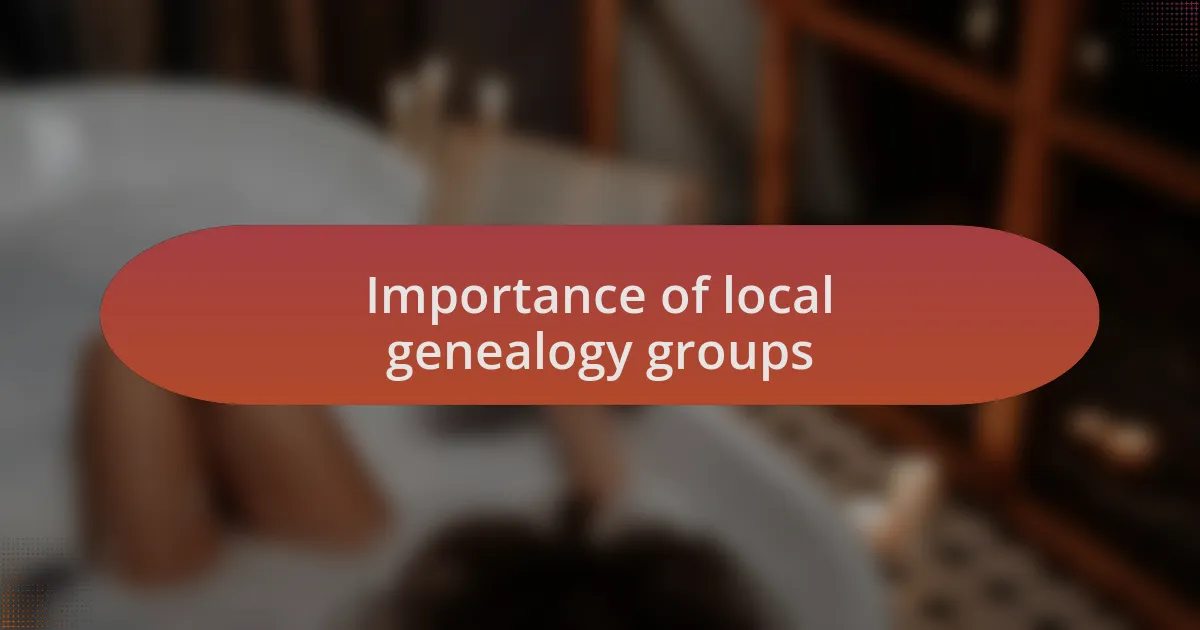
Importance of local genealogy groups
Local genealogy groups provide invaluable community support, fostering connections that go beyond mere shared interests. I remember a workshop where someone shared their struggle with a particularly tricky ancestor. The group rallied around them, offering insights and even resources to tackle the challenge. It made me realize the power of collective knowledge—when we come together, we amplify our individual efforts.
The importance of local genealogy groups also lies in the diverse expertise they gather in one space. I’ve noticed that members often specialize in different areas, from military records to immigration histories. It’s like having a mini-university at our fingertips. I often ask myself how my research would have stalled without the encouragement and expertise of my fellow group members. Their unique skills can be the missing puzzle pieces to our family stories.
Moreover, these groups create a sense of belonging among people with shared goals and passions. I distinctly recall a group outing to a local historical society where we dug through old ledgers. The laughter and camaraderie made the day feel less like research and more like an adventure. Isn’t it refreshing to be surrounded by others who not only understand but celebrate our journeys into the past? The emotional connections we build through these shared experiences are as enriching as the research itself.
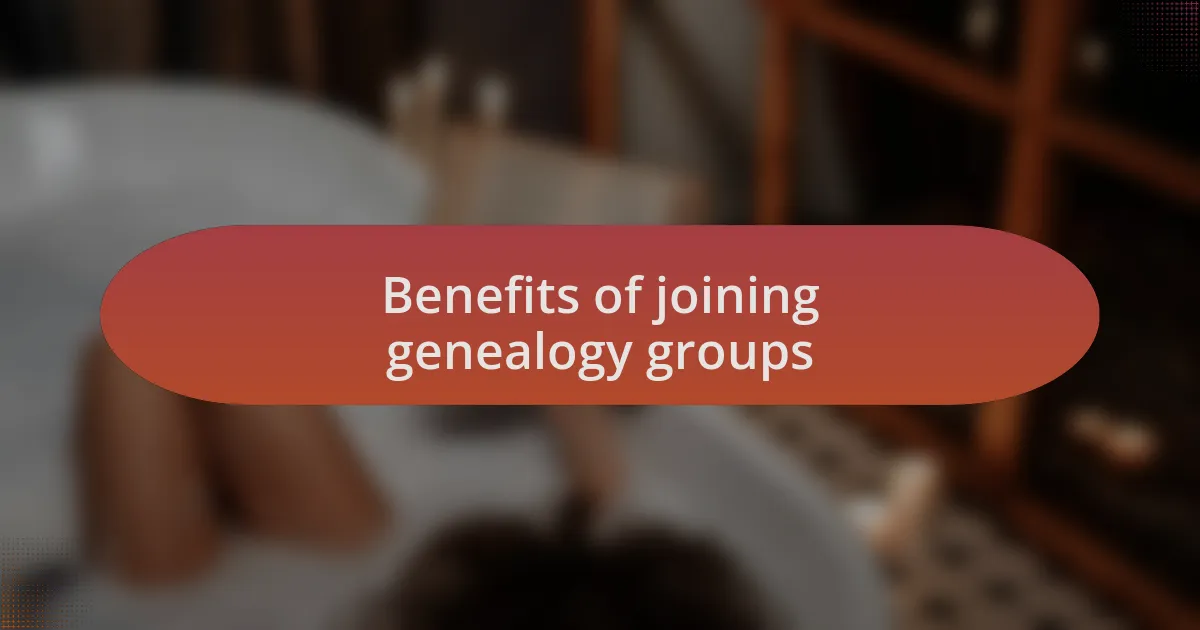
Benefits of joining genealogy groups
Joining genealogy groups offers a treasure trove of resources that can significantly enhance our research efforts. I recall the first time I attended a meeting, captivated by the wealth of books and archives at my fingertips. It dawned on me how much richer my understanding became simply by tapping into the collective resources available. Who knew that sharing a story could connect me to resources I had never even considered?
One of the most rewarding aspects of these groups is the opportunity for collaborative problem-solving. In one memorable session, I shared my frustration over a missing ancestor in the records. It was heartening to see others jump in with fresh perspectives I hadn’t thought of before. This collaboration often leads to breakthroughs and delights—how often do we stumble upon a long-lost descendant or a vital document because a fellow member had an idea or a lead?
Beyond the practical benefits, the friendships I’ve formed in these groups have enriched my genealogy journey in unexpected ways. I remember a lunch where a friend I met through the group and I exchanged personal stories that revealed surprising family connections. It got me thinking about how these relationships can deepen our understanding of our histories. Isn’t it wonderful to know that, while we search for our past, we’re also building meaningful connections in the present?
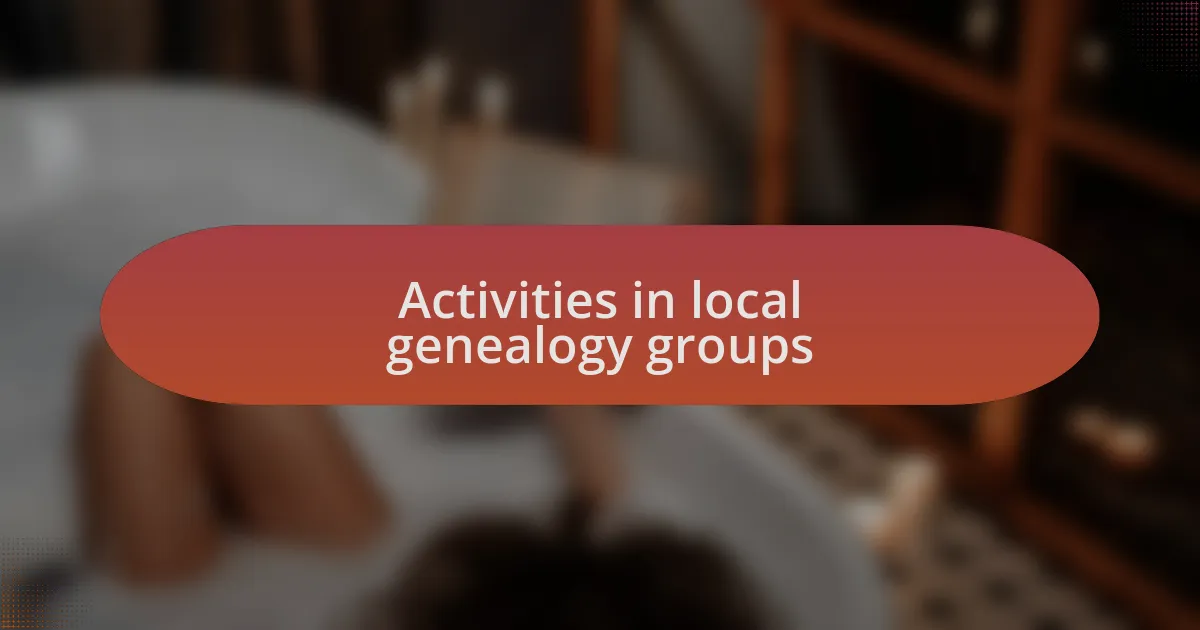
Activities in local genealogy groups
Participating in local genealogy groups opens the door to an array of engaging activities. I fondly remember our group hosting a hands-on workshop where we delved into DNA testing for genealogy. Seeing members from various backgrounds sharing their results was fascinating, as we discussed what they revealed about our ancestral roots. It felt like we were piecing together a vast puzzle, and the excitement in the room was palpable.
Monthly meetings often feature guest speakers who specialize in different aspects of genealogy, from family history research techniques to deciphering old documents. I recall a memorable presentation on the significance of local archives, which completely shifted my approach to my research. It reminded me how vital it is to tap into local resources, making the past come alive in ways I hadn’t fully appreciated before. Have you ever heard a speaker share insights that changed your perspective entirely?
Group projects, like cemetery cleanup days and photo digitization efforts, foster both teamwork and a sense of purpose. Participating in these activities opened my eyes to the amount of shared history in our communities. I remember feeling a deep connection to both the departed and my fellow volunteers, as we collectively honored those who came before us. It’s in those moments that I realized how deeply intertwined our stories truly are.
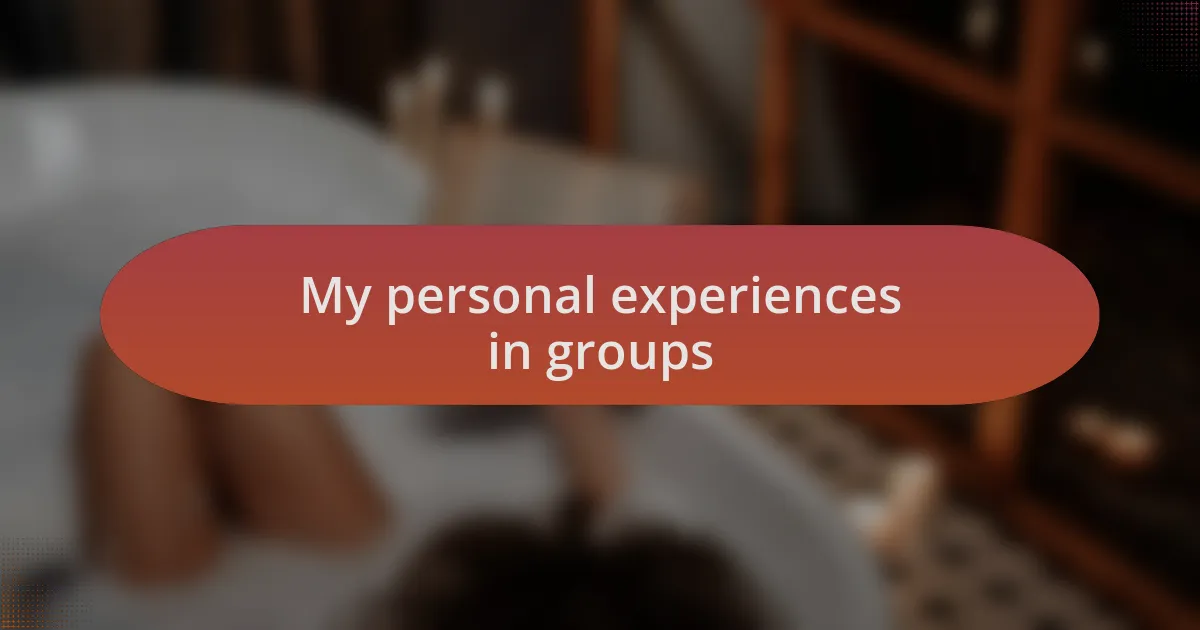
My personal experiences in groups
Being actively involved in local genealogy groups has provided me with a treasure trove of personal stories. I recall a particular evening when a fellow member shared her journey of finding a long-lost sibling through a series of serendipitous registrations. I could see the joy in her eyes as she unveiled the emotional layers of her discovery. It made me wonder: have you ever stumbled across a piece of family history that took your breath away?
One memorable experience was during a collaborative family tree project. We were all tasked with researching different branches, and I found myself connected with someone who turned out to be my third cousin! It was amazing to witness how a simple gathering can lead to deeply rooted connections we never knew existed. This made me reflect on the idea that each family story has the potential to intertwine with countless others—how many branches of your family tree are waiting to be discovered?
There are moments during these gatherings when I can feel the weight of history in the air. I once hosted a storytelling night where members recounted their most cherished family tales. Listening to them, I found my heart swelling with pride for our heritage. Each story felt like a thread pulling us closer together, reminding me of our collective journey. Isn’t it fascinating how shared narratives can shape our understanding of who we are?
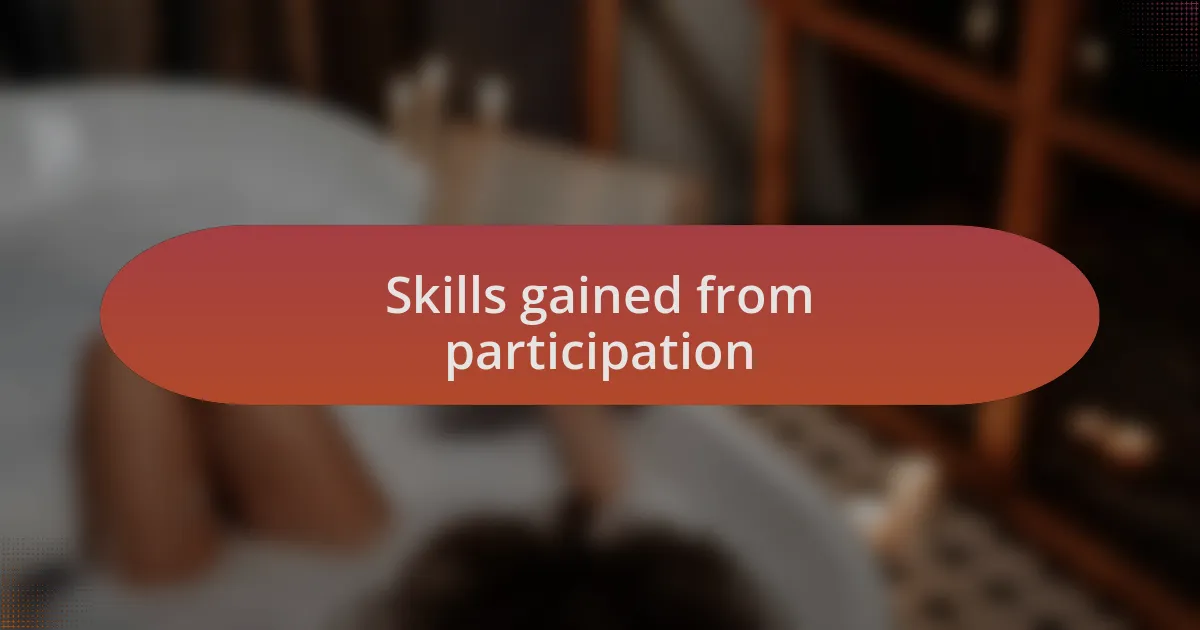
Skills gained from participation
Participating in local genealogy groups has honed my research and analytical skills immensely. I remember diving into historical archives, sifting through countless records to trace back my family lineage. Each discovery taught me the importance of critical thinking—how to evaluate sources, corroborate information, and extract meaningful insights from data. Have you ever found yourself questioning the validity of a record? That’s a skill I’ve had to master in these social settings.
Moreover, I’ve developed strong communication and collaboration skills through group projects. One time, while preparing for a presentation on immigration trends, I collaborated closely with members who had various backgrounds. This experience not only improved my ability to share information clearly but also deepened my appreciation for diverse perspectives. It made me realize how essential teamwork is in uncovering the complexities of our shared histories.
Navigating these local groups has also enhanced my ability to empathize and connect with others emotionally. I can still recall a discussion about the struggles some families faced during significant historical events. Hearing their stories reminded me that genealogy isn’t just about names and dates; it’s about understanding the human experience behind those facts. Have you ever listened to someone’s story and felt it resonate deeply within you? That’s the magic of genealogy work!